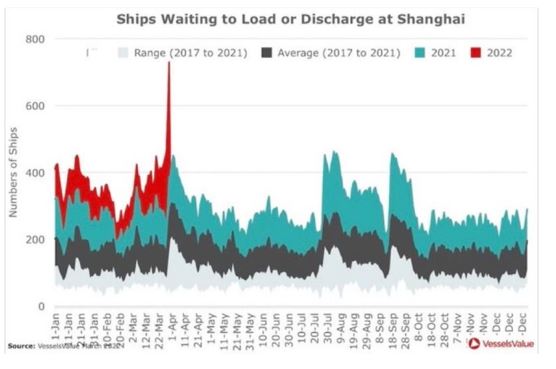Equity markets fell globally last week with investors concerned about Central Bank tightening. The MSCI World fell 2.6%, and the S&P500 fell 2.8%, led by a big sell-off on Friday.
The Australian stock market performed relatively well, with the ASX200 index falling 0.7% and the Small Ordinaries Index also down 0.7%. The best performers were the Healthcare sector which rose 3.9% on the back of a takeover offer for Ramsay Health Care (RHC), and Industrials, which rose 2.6%. The worst-performing sector was Materials down 5%, with miners Q1 production updates showing the impacts of Covid labour shortages and weather-related shutdowns. Information Technology also fell over 5% impacted by rising yields.
Fed Chair Powell stated that front-loading monetary tightening has merit. Markets interpreted it as ensuring a 50bp hike at the May meeting, sending yields higher and growth stocks lower. The yield for the 10-year US bond continued to rise, ending the week seven basis points higher at 2.91%. The Australian 10-year rose above 3%, ending the week at 3.14%, with RBA minutes suggesting a rate hike is imminent, potentially as early as May.
China’s fixed-asset investment, industrial production, and Q1 GDP were all better than anticipated, but all showed signs of slowing. Retail sales fell dramatically down 3.5% year-over-year in March. The impacts of lockdowns will be more visible in April data. Still, the weakness in retail sales demonstrates a struggling consumer. Lockdowns continue in Shanghai and other major cities, and media reports indicate Beijing may face the same fate. More policy support is required with China’s strict adherence to Covid-zero policies. However, the People’s Bank of China held the loan prime rate steady despite expectations for another cut. We do not expect to see a significant recovery in Chinese economic activity until further policy support and changes to their strict Covid-zero approach.
In US economic news, continuing jobless claims fell to their lowest level since 1970, demonstrating the continued strength of the labour market. 20% of the S&P500 index have reported Q1 2022 results, with 79% of companies reporting EPS above estimates, similar to the five-year average percentage of beats. Solid corporate earnings, particularly in the Energy and Financial sectors, help provide some support to stock prices. However, as demonstrated last week with Netflix, investors will punish high-flying growth stocks if they do not meet lofty expectations. It is a big week ahead, with one-third of the S&P500 scheduled to deliver earnings, including tech giants Amazon, Apple, Meta (Facebook), Alphabet (Google), and Microsoft.
Consumer inflation continued to rise in Europe, Canada, and New Zealand. In other news, it was a relatively quiet week in domestic economic releases. However, that will change this week, with Australian CPI figures to be released on Wednesday. It is expected to show a substantial uptick in inflation led by petrol and food prices. A surprise to the upside would add pressure on the RBA to act sooner and increase the odds of a May rate hike. We also receive US consumer confidence and personal spending releases and Q1 GDP for the US and Europe.
China lockdowns impacting supply chains
China has been experiencing its worst Covid-19 outbreaks since the beginning of the pandemic, with the Omicron variant proving challenging to contain. The Chinese government has decided to stick to its Covid-zero policy. Tens of millions of residents face strict lockdown measures in multiple cities, including crucial manufacturing hubs Shanghai and the Jilin province. With some experts predicting cities, including Beijing, will face the same fate, these lockdowns put sustained pressure on global supply chains.
China’s strict COVID-19 lockdowns will exacerbate global supply chain woes and global inflation in the coming months. Shanghai is home to the world’s largest container port. As seen in the chart below, the number of ships waiting to load or discharge at Shanghai port exploded last month. Moving goods on land has also become problematic. Quarantine controls are impacting truck drivers who are unable to move freely across the country, leading to difficulties in factories receiving raw materials to produce end-products. In an inter-connected global system, the knock-on effects will be felt at ports across the globe in the coming months.
These logical delays will lead to more persistent inflation as companies pass the rising shipping and transportation costs on to the end customer. China accounts for 18% of all the goods the US imports and over 30% of electronic and machinery components.
Lockdowns are also hurting the Chinese economy, with economists, including the International Monetary Fund, slashing Chinese growth forecasts for 2022. Suppose these lockdowns continue for an extended period. In that case, there will be implications for the Australian economy, with China the largest purchaser of iron ore and other vital commodities. Inflation will also prove a more complex problem for Central Banks to address.
We carefully monitor the latest developments and any potential changes to the Chinese Covid-zero approach or government support, given the wide-reaching impacts to investment markets across the globe.
–
Wednesday 27 April 2022, 10am
For more information on the above please contact Bentleys Wealth Advisors directly or on +61 2 9220 0700.
This information is general in nature and is provided by Bentleys Wealth Advisors. It does not take into account the objectives, financial situation or needs of any particular person. You need to consider your financial situation and needs before making any decision based on this information.




